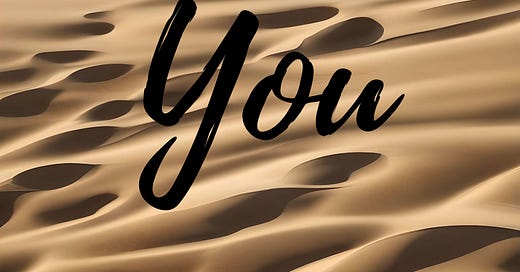Maybe You
He isn’t the only one with an ear almost blasted off. Maybe you are similarly afflicted— capacity for listening gone, obliterated by a fear that rips right through you. You try to make yourself bulletproof. You crouch there, strafing blame, building walls of words designed to wound. You let fear sever you from the other half. You really believe there is some other half. Maybe fear has severed you from yourself? Maybe I am you.
The Prompt
This week, I’ve been feeling—and fearing—the fracture and polarization that seem to define American political life at present. I’m guessing many of you have, too. At the same time, I’ve been reflecting on a brilliant craft talk I attended, given by
as part of ’s Conscious Writers Collective. Padraig spent the entire two hours exploring and illuminating the word “you”—a word that is contained either explicitly or implicitly in every poem. As William Waters wrote in “Poetry’s Touch” (I know this only because Padraig said so, I haven’t yet read the book), “for a poem to say you is in every case a complex act.”Here’s an exercise to try, if you’re in a trying mood . . . look back over the last few poems you’ve written. Who is the “you” that is talked about, addressed, or implied in each of these poems? What is your relationship to that “you”? If the “you” is the reader, what work do you do within the poem to cultivate and shape that relationship? How would the poem change if “you” were swapped out for “I” or “they” or some other pronoun?
After attending the craft talk, I knew I wanted to write a poem that played a bit with the notion of “you.” I don’t know how well the poem I shared above will work for anyone else, but the process of writing it helped me to deepen my awareness of the ways in which I am part of the fracture, polarization, and divisiveness that trouble me so. I intentionally wrote the poem with a bit of a finger-pointing vibe because finger pointing is all the rage at present. My intention is for the final two lines of the poem “Maybe I / am you” to flip this on its head, though, turning the finger back toward me, with the implication that the entire poem could be rewritten or reread with the word “I” in place of “you.” To me, this feels like a poem of confession, rather than one of accusation. The time I spent sitting with this poem and the complexity of its “you” has me wanting to do better—to more fully release the notion that there is “some other half” that is fundamentally different from me.
If you’d like a prompt to play with, then I invite you to play with the word “you.” You might, for example, write a poem that addresses a particular you, a poem that explores the connections between some “you” and yourself, or a poem that contains a conversation between you and yourself. If you need some help getting started, look at the way “you” shows up in recent poems or correspondences that you’ve written. Listen for the word “you” in your conversations as you go about your day. Notice how and where it appears (and with what assumptions) in the books, articles, emails, or social media posts you read today. Your poem doesn’t necessarily need to be about any of this—nor does it need to explicitly include the word “you”—but my hope is that something interesting and new will emerge for you through this exploration.
I look forward to reading what you share, friends! I feel so nourished by your poems and your kind words. I’m grateful for this little community, in which we have diverse political and religious views—none of which alter the truth of our interconnectedness.






Love this post and poem!!! 🫶🏼
This is such a powerful & beautifully crafted poem Lisa. In this fraught time poetry matters in the way that you have shown us here. Thank you!